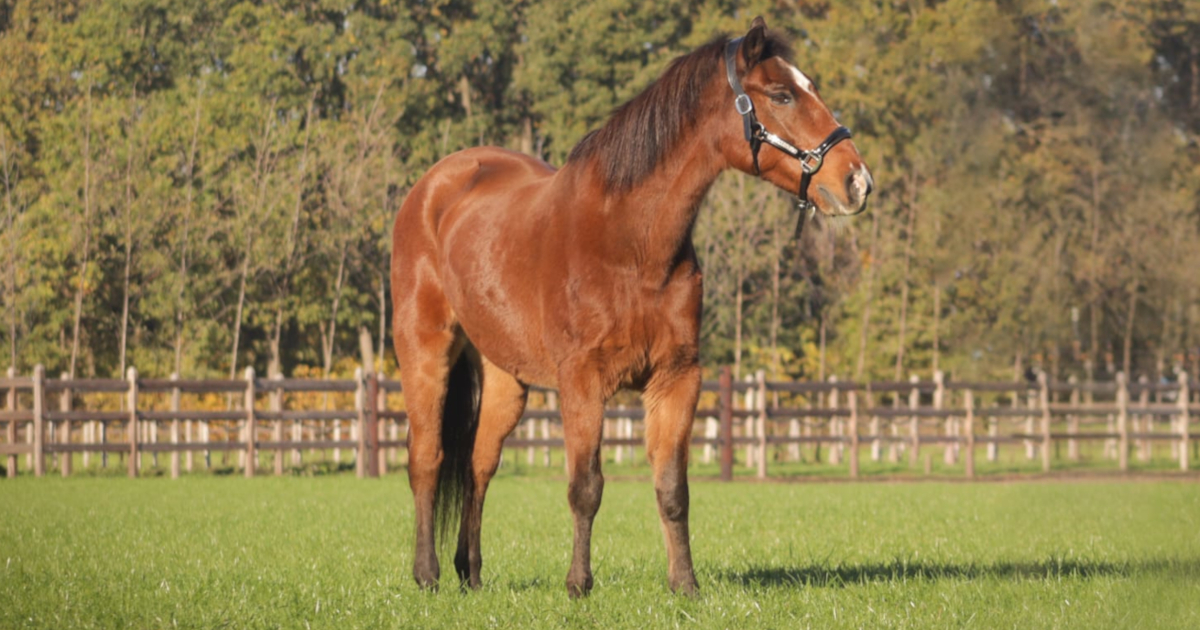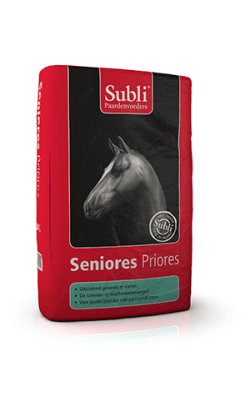Healthy old horses also need modified feed
January 14, 2025

The 39-year-old Sebas of horse farm the Smulhoeve, big fan of Subli Seniores Priores
When you think of an older horse, you probably have a certain image of it. A less tight topline, slightly leaner on the ribs and some roughage crammed in front of the box door. Our nutritionist Wendy Warmerdam explains how the horse's body and associated feed requirements change.
Chewing becomes more difficult
Wendy: "When a horse gets older you see changes in the teeth. The molars wear down more and the horse cannot chew as well. Furthermore, you often see some muscle deterioration, which includes the chewing muscles. Grinding the food is therefore less easy and less saliva is produced. This makes it more difficult to digest the feed properly. In addition, older horses swallow larger chunks of feed which can cause esophageal blockage. Further down the digestive tract, things can also become more difficult. You then often see undigested food back in the manure. This is just the beginning of the digestive problems, as these horses can still absorb roughage. When this too becomes more difficult, the challenge of getting all the nutrients needed really begins."
Calcium-phosphorus ratio changes
"With the decline in muscling, the need for easily digestible protein becomes higher. You also see things happening in the bones; for example, there may be osteoarthritis. Calcium and phosphorus are important minerals for bones. The right calcium-phosphorus ratio is particularly important here. In older horses, you see the phosphorus requirement becoming higher than the calcium requirement. So make sure that you don't give too much calcium anymore, but offer enough phosphorus. You can't see the effect on the outside, because this is really about the bones. Extensive research has shown that changing requirement."
Increased need for energy and vitamins
"With an aging horse, energy requirements increase. Older horses have a little more trouble staying warm in cold weather. So in winter you need to offer them enough energy so they can keep themselves warm. When horses are cold, you see that they expand their coat. If you feed too little energy over a longer period of time, you will see those horses lose weight. Furthermore, it is important to include extra antioxidants in the diet. By doing so, you offer the horse's body additional protection against the natural aging process. Vitamin C is an important antioxidant, as are vitamin E and selenium."
Subli Seniores Priores
"Subli has for almost twenty years Seniores Priores in its range, a unique roughage and concentrate replacement in one. To determine the composition, all the needs of horses that can no longer consume roughage at the end of the day were analyzed. The product has been developed further and further: today it contains less sugar and starch and more energy. The amount of vitamins has also been adjusted. With one feed product you can thus give your old horse everything it needs. Seniores Priores can also be used as a supplementary feed. This does require a different feed recommendation than the feed recommendation for horses that no longer absorb roughage."

Experience from Paardenboerderij de Smulhoeve
"39-year-old Sebas has been with us at the Smulhoeve since he was two years old. Now that he is getting older, his teeth are getting worse and he can no longer eat hay properly and makes a lot of cramming. With Seniores Priores, however, he stays fit and happy. We give him 9 scoops daily, divided into 3-4 servings, and he still enjoys standing in the pasture every day. Seniores Priores ensures that he, like our other oldsters over 30, can grow old healthily."
Continue to offer forage
"Seniores Priores is a product that you feed wet and lacks the fiber length of roughage, so horses won't chew it for long. So we always advise offering roughage anyway, even if he can no longer absorb it well. This is because chewing movement and salivation are very important. You can, however, adjust the roughage. For example, give softer or leafier roughage instead of stalky roughage, which is easier to chew and is crushed earlier. A horse can then still absorb some nutrients from that."
Wet feeding
"Seniores Priores should not be fed dry but should be soaked for a few hours. Beet pulp is an important raw material in Seniores Priores and has the property that it expands when water is added. When you feed it dry, it only becomes moist when the horse chews and swallows it, this can cause it to expand in the esophagus, with all the unpleasant consequences. Seniores Priores must soak for at least four hours before you feed it. It's fine to soak it in the morning before feeding it in the evening, but make sure the feed is covered and in a cool place."
TERUG NAAR HET OVERZICHT